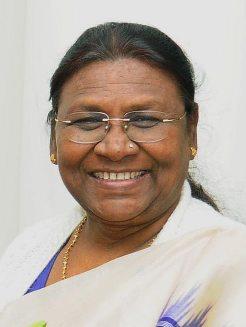
About the President of India with Articles.
Article 52 There shall be a President of India.
Article 53 The President is the Head of the Union Executive.
Article 54 Deals with the Election of the President. The President of India is indirectly elected by the electoral college ,which consist of the elected member of both the houses that is Lok Sabha and Rajya Sabha and the elected member of the Legislative Assemblies of all the state and Union Territories .Legislative Council and nominated member of the Lok sabha and Rajya Sabha do not take part in the election of the President.
- Voting is done through secret ballot , which is single transferable vote.
Article 56 Tenure of the President.
- The President Term of Office is 5 Year from the date on which he enter upon the Office.
- An Election of the president must be completed before the expiration of the term. If due to some unexpected condition the election was not able to conduct then he can act as president up to maximum of 6 month within this spin of time election must be conducted.
Article 57 Eligibility for Re-Election of President.
- On the expiry of his term of Office.
- By his Death.
- By his resignation. (President can submit a resignation in writing addressed to the Vice President and inform it to the Lok Sabha Speaker.
- On his removal by impeachment.
- If election was unfair. (Dispute in election goes to Supreme court)
Article 58 Qualifications for election as President.
- Citizen of India.
- Have completed the age of 35 year.
- Must be qualified for the election as a member of the Lok Sabha.
- Must not hold any Office of profit ,means he is not working in Government job . (The President should not be the member any of the house of Parliament or the house of legislature of any state, If he is elected as a President he need to vacant his seat in that House.)
Article 60 Oath or affirmation of president is taken by Chief Justice of India or by the Senior most judge of Supreme Court.
Article 61 Impeachment of President.
Impeachment means removal of President from his post. The procedure for impeachment of the President is taken from USA constitution. The President can be removed for his post in case of Violation of the Constitution by him. Either the Rajya Sabha or Lok Sabha can put the charge of violation of the constitution by the President. They have to issue a notice in writing signed by 1/4 member of that house and give the notice to the president 14 day before the resolution is bring before the houses.
And if the resolution is passed with more the 2/3 total member of the house ,then this resolution is passed to another house if there also the resolution is passed with 2/3 member then the president shall be removed.
In the Impeachment procedure nominated member of Rajya sabha and Lok sabha also take part , But the member of Legislative Assembly do not take part on it.
List of Presidents and there Tenure.
| Name | Tenure |
| 1. Dr. Rajendra Prasad | 1950 – 1962 |
| 2. Dr. S. Radhakrishnan | 1962 – 1967 |
| 3. Dr. Zakir Hussain | 1967 – 1969 |
| 4. Sri V.V Giri | 1969 – 1974 |
| 5. Dr. Fakhruddin ali Ahmed | 1974 – 1977 |
| 6. Sri N. Sanjeeva Reddy | 1977 – 1982 |
| 7. Giani Zail Singh | 1982 – 1987 |
| 8. Sri R. Venkataraman | 1987 – 1992 |
| 9. Dr. Shankar Dayal Sharma | 1992 – 1997 |
| 10. Sri K.R Narayanan | 1997 – 2002 |
| 11. Dr. A.P.J Abdul kalam | 2002 – 2007 |
| 12. Smt. Pratibha Devi Patil | 2007 – 2012 |
| 13. Sri Pranab Mukherjee | 2012 – 2017 |
| 14. Sri Ram Nath Kovind | 2017 – 2022 |
| 15. Smt. Droupadi Murmu | 2022 till date |
- Dr. Rajendra Prasad was the only president to be elected twice.
- Neelam Sanjiv reddy was only President to be elected unopposed , He was the youngest President of India. Before elected he was the speaker of the Lok Sabha.
- Justice M Hidayatullah is the only chief justice of Indian who had hold the position of President .
- Zakir Hussain is the shortest serving president.
- Two President Dr Zakir Hussain and Fakhruddin Ali Ahmed have died in office.
- Mrs Pratibha Patil was the first and only woman President of india.
- Manohara Holkar was the first woman to contest in a presidential election of India in 1967.
- During the Emergency Fakhruddin Ali Ahmed was the President of India.
Legislative Power of The President.
- The President Summon or prorogue the House of Parliament and to dissolve the Lok Sabha.
- The President address the Parliament after the general election and also after at the beginning of the first session every year.
- The President have power to summon a joint sitting of both Houses of Parliament in case of deadlock between them.
- He has power to nominated 12 member in Rajya Sabha .
- All bills passed by a parliament can become laws only after receiving the assent of the President.
- President have the veto power that are Absolute , suspensive and pocket veto
The Ordinance Power of The President ( Article 123)
When either of the two Houses of the parliament of India are not in session and law is immediately required , The President can pass an ordinance which have the same force and effect as an act passed by parliament under its legislative power.
The Ordinance will become law if it is pass within 6 week when Parliament state it session or under 6 month if session is not there in Parliament.
Judicial Power ( Article 72)
The President have power to grant Pardon , Reduce the punishment to any person who has been convicted by the court of Law.
Only President have power to Pardon from capital punishment (hang till death).
Emergency Power
The President of India have extraordinary power to in time of emergency.
Article 352 Emergency due to armed rebellion o external aggression i.e. War with other country . Till now this power is used three time in 1962 , 1971 , 1975.
Article 356 Provisions in case of failure of constitutional machinery in state , commonly knows as presidential rule .
Presidential rule can be up to 6 month and with the permission of the parliament it can be maximum extended till 3 year.
Article 360 Financial Emergency , till now it is not imposed in India.
Financial Power
- A Money bill can be introduced in the Lok Sabha only with the President recommendation.
- Budget is finally need to be approved by the President.
- The President can take advance out of the contingency fund (Art. 266) of India to meet unforeseen expenses.
- The President constitutes a Finance Commission ( Art. 280 ) every five year to recommend the distribution of the taxes between the center and the state.
Military Power
- The President is the Supreme commander of the Indian Armed Forces.
- The President can declare war or conclude the peace on the advice of the Union Council of Minister headed by the Prime Minister.
